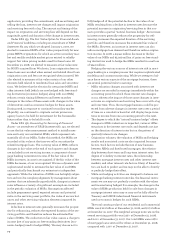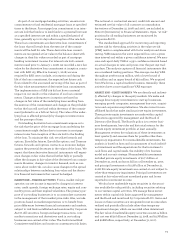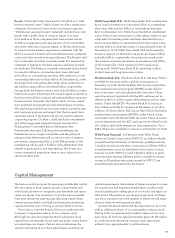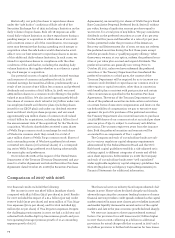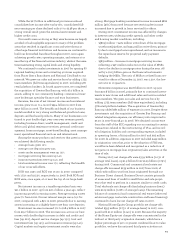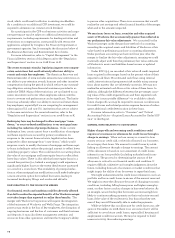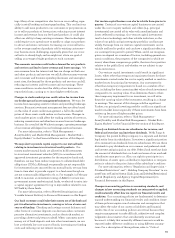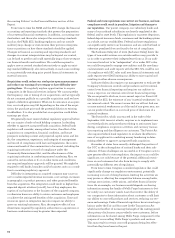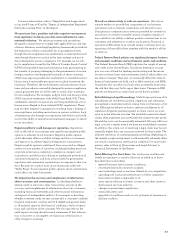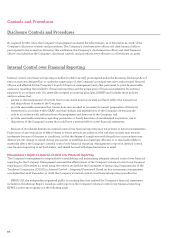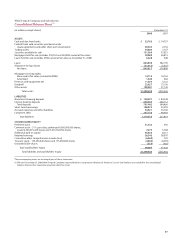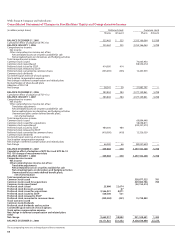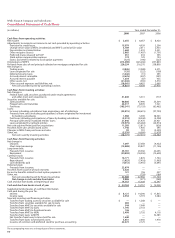Wells Fargo 2008 Annual Report Download - page 82
Download and view the complete annual report
Please find page 82 of the 2008 Wells Fargo annual report below. You can navigate through the pages in the report by either clicking on the pages listed below, or by using the keyword search tool below to find specific information within the annual report.Changes in interest rates could also reduce the value of our
mortgage servicing rights and mortgages held for sale, reducing
our earnings. We have a sizeable portfolio of mortgage servicing
rights. A mortgage servicing right (MSR) is the right to service a
mortgage loan—collect principal, interest and escrow amounts—
for a fee. We acquire MSRs when we keep the servicing rights
after we sell or securitize the loans we have originated or when
we purchase the servicing rights to mortgage loans originated by
other lenders. We initially measure and carry our residential
MSRs using the fair value measurement method. Fair value is the
present value of estimated future net servicing income, calculat-
ed based on a number of variables, including assumptions about
the likelihood of prepayment by borrowers.
Changes in interest rates can affect prepayment assumptions
and thus fair value. When interest rates fall, borrowers are more
likely to prepay their mortgage loans by refinancing them at a
lower rate. As the likelihood of prepayment increases, the fair
value of our MSRs can decrease. Each quarter we evaluate the
fair value of our MSRs, and any decrease in fair value reduces
earnings in the period in which the decrease occurs.
We measure at fair value new prime mortgages held for sale
(MHFS) for which an active secondary market and readily avail-
able market prices exist. We also measure at fair value certain
other interests we hold related to residential loan sales and secu-
ritizations. Similar to other interest-bearing securities, the value
of these MHFS and other interests may be negatively affected by
changes in interest rates. For example, if market interest rates
increase relative to the yield on these MHFS and other interests,
their fair value may fall. We may not hedge this risk, and even if
we do hedge the risk with derivatives and other instruments we
may still incur significant losses from changes in the value of
these MHFS and other interests or from changes in the value of
the hedging instruments.
For more information, refer to “Critical Accounting Policies”
and “Risk Management – Asset/Liability and Market Risk
Management – Mortgage Banking Interest Rate and Market Risk”
in the Financial Review section of this Report.
Our mortgage banking revenue can be volatile from quarter to
quarter. We earn revenue from fees we receive for originating
mortgage loans and for servicing mortgage loans. When rates
rise, the demand for mortgage loans tends to fall, reducing the
revenue we receive from loan originations. At the same time, rev-
enue from our MSRs can increase through increases in fair value.
When rates fall, mortgage originations tend to increase and the
value of our MSRs tends to decline, also with some offsetting rev-
enue effect. Even though they can act as a “natural hedge,” the
hedge is not perfect, either in amount or timing. For example, the
negative effect on revenue from a decrease in the fair value of
residential MSRs is immediate, but any offsetting revenue bene-
fit from more originations and the MSRs relating to the new
loans would accrue over time. It is also possible that, because of
the recession and deteriorating housing market, even if interest
rates were to fall, mortgage originations may also fall or any
increase in mortgage originations may not be enough to offset
the decrease in the MSRs value caused by the lower rates.
We typically use derivatives and other instruments to hedge
our mortgage banking interest rate risk. We generally do not
hedge all of our risk, and the fact that we attempt to hedge any of
the risk does not mean we will be successful. Hedging is a com-
plex process, requiring sophisticated models and constant moni-
toring, and is not a perfect science. We may use hedging instru-
ments tied to U.S. Treasury rates, LIBOR or Eurodollars that may
not perfectly correlate with the value or income being hedged.
We could incur significant losses from our hedging activities.
There may be periods where we elect not to use derivatives and
other instruments to hedge mortgage banking interest rate risk.
For more information, refer to “Risk Management –
Asset/Liability and Market Risk Management – Mortgage
Banking Interest Rate and Market Risk” in the Financial Review
section of this Report.
We could recognize other-than-temporary impairment on secu-
rities held in our available-for-sale portfolio, including perpetu-
al preferred stock, if economic and market conditions do not
improve. Our securities-available-for-sale portfolio had gross
unrealized losses of $12.2 billion at December 31, 2008. We ana-
lyze securities held in our available-for-sale portfolio for other-
than-temporary impairment on a quarterly basis. The process for
determining whether impairment is other than temporary requires
difficult, subjective judgments about the future financial perfor-
mance of the issuer and any collateral underlying the security in
order to assess the probability of receiving all contractual principal
and interest payments on the security. Because of changing eco-
nomic and market conditions affecting issuers and the perfor-
mance of the underlying collateral, we may be required to recog-
nize other-than-temporary impairment in future periods, thus
reducing earnings.
For more information, refer to “Overview – Current Accounting
Developments,” “Balance Sheet Analysis – Securities Available
for Sale” and Note 5 (Securities Available for Sale) to Financial
Statements in this Report.
Financial difficulties or credit downgrades of mortgage and bond
insurers may negatively affect our servicing and investment
portfolios. Our servicing portfolio includes certain mortgage loans
that carry some level of insurance from one or more mortgage
insurance companies. To the extent that any of these companies
experience financial difficulties or credit downgrades, we may be
required, as servicer of the insured loan on behalf of the investor,
to obtain replacement coverage with another provider, possibly
at a higher cost than current coverage. We may be responsible
for some or all of the incremental cost of the new coverage for
certain loans depending on the terms of our servicing agreement
with the investor and other circumstances. Similarly, some of the
mortgage loans we hold for investment or for sale carry mortgage
insurance. If a mortgage insurer is unable to meet its credit
obligations with respect to an insured loan, we might incur higher
credit losses if replacement coverage is not obtained. We also have
investments in municipal bonds that are guaranteed against loss
by bond insurers. The value of these bonds and the payment of
principal and interest on them may be negatively affected by
financial difficulties or credit downgrades experienced by the
bond insurers.
For more information, refer to “Earnings Performance –
Balance Sheet Analysis – Securities Available for Sale” and “Risk
Management – Credit Risk Management Process” in the
Financial Review section of this Report.
Our ability to grow revenue and earnings will suffer if we are
unable to sell more products to customers. Selling more prod-
ucts to our customers—“cross-selling”—is the cornerstone of our
business model and key to our ability to grow revenue and earn-


